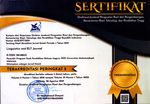Exploring the Implementation of Task-Based Language Learning Model: a Review of Studies on Students' Perceptions
Abstract
This study attempt to investigate the students’ perception on the implementation of Task-Based Language Learning (TBLL) Model. The study involved 18 EFL students as the participants. The data was collected from questionnaire that were administered to all participants and interviews to some students as the representatives. The result showed that the developed model which highlights teaching steps, classroom situation, time allocation, writing activities, and lecturers' performance in the class and the teaching materials are effective to facilitate students to learn and improve their writing skills. The result of this study also revealed that the developed model was perceived by the students to be very well structured because the learning stage started from introducing to presenting stage, the interaction between the lecturers and the students in the academic writing course was very responsive, the students thought that the lecturers treated the students well, most students had positive perceptions of the teaching materials of academic writing subjects and they felt the learning objectives were achieved. They were able to write topic sentences and composed a full text, their writing structure was better, and they recognized the small things. Then, students became more active, motivated and their understanding of the topic was increased.
Keywords
Full Text:
PDFReferences
Abraham, A. P. (2015). Teaching and Learning to Write: Using a Task-Based Approach in an EFL Class. In Methodologies for effective Writing Instruction in EFL and ESL Classrooms (Issue March, pp. 115–129). IGI Global. https://doi.org/10.4018/978-1-4666-6619-1.ch008
Ayustina, K. P. P., Batan, I. G., & Mahayanti, N. W. S. (2018). A Study of Teachers’ Roles in the Implementation of Scientific Approach in Teaching English at SMPN 1 Singaraja. International Journal of Language and Literature, 2(3), 108–116.
Bula-Villalobos, O., & Murillo-Miranda, C. (2019). Task-based Language Teaching: Definition, Characteristics, Purpose and Scope. International Journal of English Literature and Social Sciences, 4(6), 1869–1878. https://doi.org/10.22161/ijels.46.39
Carless, D. (2002). Implementing Task-Based Learning with Young Learners. ELT Journal, 56(4), 389–396.
Douglas, S. R., & Kim, M. (2014). Task-Based Language Teaching and English for Academic Purposes : An Investigation into Instructor Perceptions and Practice in the Canadian Context. TESL Canada Journal, 31(8), 1–22.
Ellis, R. (2003). The Methodology of Task-Based Teaching. In Task-Based Language Learning and Teaching (pp. 79–101). Oxford University Press.
Ellis, R. (2009). Task-based language teaching : sorting out the misunderstandings. International Journal of Applied Linguistics, 19(3), 221–246.
Freeman, D. L., & Anderson, M. (2011). Techniques & Principles in Language Teaching. In Oxford University Press (3rd ed.). Oxford University Press. https://doi.org/10.1016/s1359-6349(10)70108-7
Hismanoglu, M., & Hismanoglu, S. (2011). Task-based language teaching : what every EFL teacher should do. Procedia - Social and Behavioral Sciences, 15, 46–52. https://doi.org/10.1016/j.sbspro.2011.03.049
Jeon, I.-J., & Hahn, J. (2006). Exploring EFL Teachers ’ Perceptions of Task-Based Language Teaching : A Case Study of Korean Secondary School Classroom Practice. Asian EFL Journal, 8(1).
Kumaravadivelu, B. (2006). TESOL Methods : Changing Tracks ,Challenging Trends. Tesol Quarterly, 40(1), 59–81.
Littlewood, W. (2004). The task-based approach : some questions and suggestions. ELT Journal, 58(October), 319–326.
Mcdonough, K., & Chaikitmongkol, W. (2007). Teachers’ and Leaners’ Reactions to a Task-Based EFL Course in Thailand. Tesol Quarterly, 41(1), 107–132.
Megan, Y. S. C. (2014). Task-based language learning and teaching: An action-research study. Language Teaching Research, August, 1–19. https://doi.org/10.1177/1362168814547037
Naibaho, L. (2019). Teachers’ Roles on English Language Teaching: A Students Centered Learning Approach. International Journal of Research, 7(4), 206–212. https://doi.org/10.5281/zenodo.2653853
Nunan, D. (2004). Task-based Language Teaching. Cambridge University Press.
Prabhu, N. S. (1987). Second Language Pedagogy (first edit). Oxford University Press.
Razali, R., & Jupri, R. (2014). Exploring Teacher Written Feedback and Student Revisions on ESL Students ’ Writing. Journal of Humanities and Social Science, 19(5), 63–70. https://doi.org/10.9790/0837-19556370
Renandya, W. A. (2012). Teacher Roles in EIL. The Europian Journal of Applied Linguistics and TEFL, 1(2), 65–80.
Richards, J. C., & Rodgers, T. S. (2001). Approaches and Methods in Language Teaching. Cambridge University Press.
Rindu, I., & Ariyanti. (2017). Teacher ’ s Role in Managing the Class during Teaching and Learning Process. Script Journal: Journal of Linguistic and English Teaching, 2(1), 83–100. https://doi.org/10.24903/sj.v2i1.77
Shehadeh, A. (2005). Task-based language Learning and Teaching: Theories and Application. In C. Edward & J. Willis (Eds.), Teachers Exploring Tasks in English Language Teaching. Palgrave Macmillan.
Tomlinson, B. (2011). Introduction: Principles and Procedure of Materials Development. In B. Tomlinson (Ed.), Material Development in Language Teaching (pp. 1–31). Cambridge: Cambridge University Press.
Waluyo, B. (2019). Task-based language teaching and theme-based role-play: Developing EFL learners’ communicative competence. Electronic Journal of Foreign Language Teaching, 16(1), 153–168.
Willis, D., & Willis, J. (2007). Doing Task-Based Teaching (Oxford Handbooks for Language Teachers). Oxford University Press.
Willis, J. (1996). A Framework for Task-Based Learning. Longman.
DOI: https://doi.org/10.31764/leltj.v10i2.6927
Refbacks
- There are currently no refbacks.
Copyright (c) 2021 Linguistics and English Language Teaching Journal

This work is licensed under a Creative Commons Attribution-ShareAlike 4.0 International License.
_____________________________________________________
Linguistics and ELT Journal
p-ISSN 2339-2940 | e-ISSN 2614-8633

LELTJ is licensed under a Creative Commons Attribution-ShareAlike 4.0 International License.
_____________________________________________________
LELTJ is abstracting & indexing in the following databases:
_____________________________________________________
LELTJ Editorial Office:













